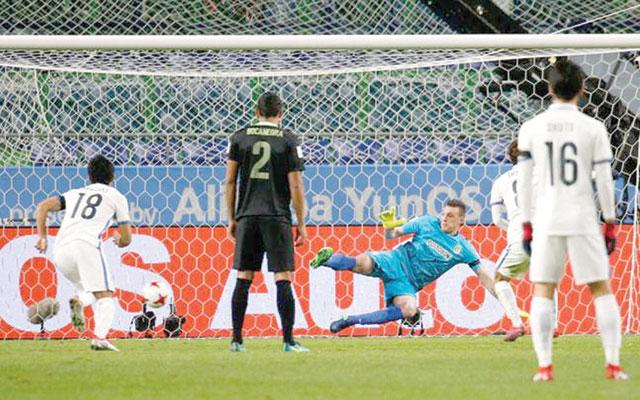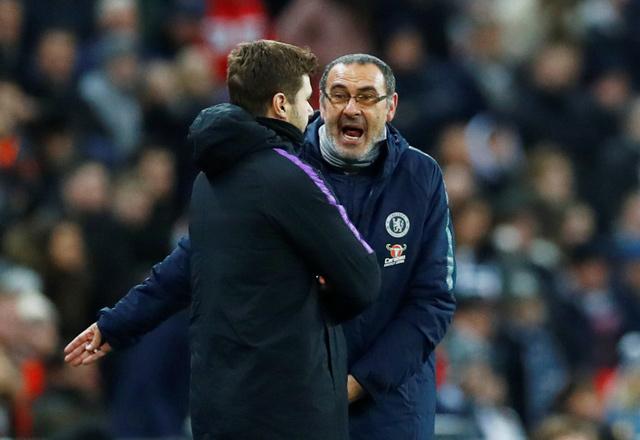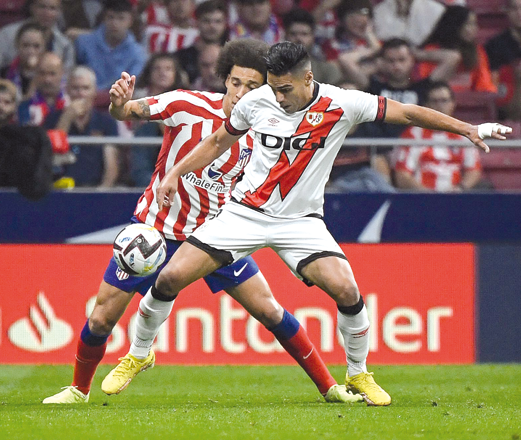You are here
Video evidence in football used for first time to award penalty
By Reuters - Dec 14,2016 - Last updated at Dec 14,2016

Kashima Antlers' Shoma Doi (right) scores a penalty goal during their match against Atletico Nacional's at the FIFA Club World Cup tournament at Suita City Football Stadium in Suita, western Japan, on Wednesday (AP photo by Eugene Hoshiko)
OSAKA — Video evidence was used to award a penalty for the first time in a FIFA competition at the Club World Cup on Wednesday when the referee gave Kashima Antlers a controversial spot kick in their 3-0 semifinal win over Colombia's Atletico Nacional.
An off-field official known as a video assistant referee (VAR) called attention to an infringement by Orlando Berrio and Hungarian referee Viktor Kassai walked to the side of the pitch to review the incident on a computer screen.
Kassai gave the 33rd minute penalty that Shoma Doi converted to give a 1-0 lead to Japanese side Kashima, who will play either Real Madrid or Mexico's Club America in Sunday's final.
Berrio could clearly be seen tripping opponent Daigo Nishi as the players moved into the box to challenge for a free kick.
However, the penalty decision provoked anger worldwide on twitter from fans who believe the video evidence also showed Nishi was in an offside position when the free kick was taken.
There was also concern that the referee was only permitted to watch the replay once the ball had gone out of play, which happened only after Atletico broke upfield on a counter attack.
FIFA later issued a statement clarifying its position on both issues and backing Kassai's performance.
"On the half-hour mark, after receiving information about a missed incident from Video Assistant Referee Danny Makkelie, referee Viktor Kassai made the TV signal to indicate that he would conduct an on-field review of footage via the pitch-side monitor," the statement said.
"Prior to that, the assistant referee had correctly applied the 'wait and see' technique with regard to the offside position of the player who was fouled."
"The offside offence never materialised because the player was unable to challenge the opponent for the ball, and the Hungarian referee subsequently pointed to the penalty mark, judging from the replay that Daigo Nishi had been tripped inside the penalty area by Atletico's Orlando Berrio."
Football's world governing body has called the technology a "big step forward" for the game but had also said it was entering "uncharted waters".
The trial during seven matches in Japan involves off-field VARs monitoring the action and calling the referee's attention to "clear mistakes in match-changing situations", such as goals, penalty decisions, direct red cards and mistaken identity.
Its trial use at the Club World Cup — a tournament for the world's continental title holders plus the host nation's champions — follows the successful introduction of goal-line technology used to rule when a ball has crossed the goal line.
Leagues in 12 countries have confirmed they will participate in a two-year experiment with VARs.
Related Articles
MADRID — Cristiano Ronaldo scored a hat-trick to send Real Madrid to the Champions League semifinals with a 4-2 extra-time win and 6-3 aggre
LONDON — Tottenham Hotspur manager Mauricio Pochettino was critical of video assistant referee (VAR) technology on Tuesday despite the syste
MADRID — Former Atletico Madrid striker Radamel Falcao earned Rayo Vallecano a 1-1 draw against his old side in La Liga with a 92nd minute p



















